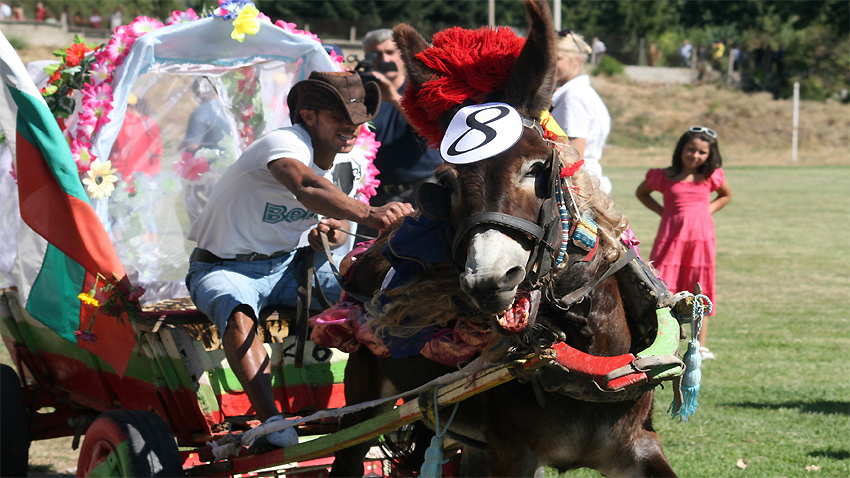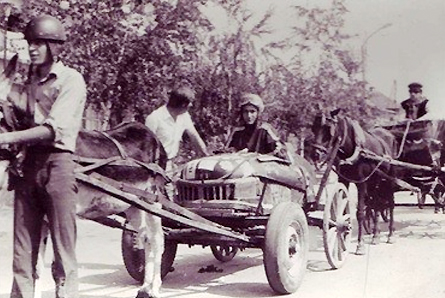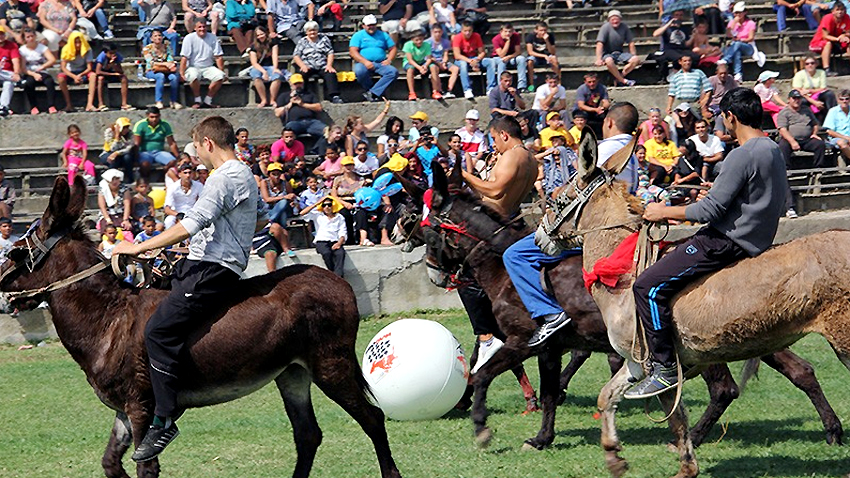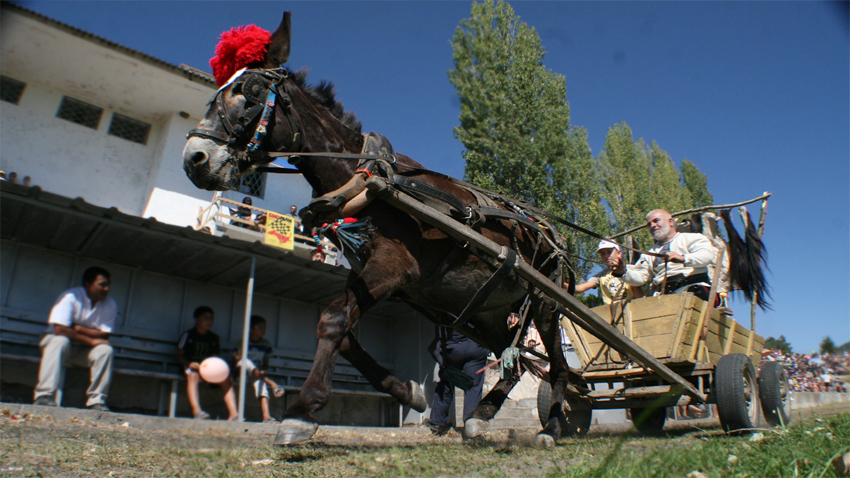Long before quidditch emerged in the magical world of Harry Potter, residents of a small Bulgarian municipality transformed the strict rules of football into something more attractive. From the back of their long-eared animals they started enjoying donkey football. Too bad that no one has yet included this fact in encyclopaedias of curiosities. They should do it, as Gourkovo is the only place in the world where King Football depends on... donkeys.
Generally, the donkey is highly-respected here. In addition to the aristocratic feeling you receive when you hear their baritone melismas, in Gourkovo these animals are surrounded by a fragrant cloud. Located in the Rose Valley, Gourkovo is famous for the ability of its citizens to grow fragrant flowers, which are present in every home. But since this is a story primarily about donkeys, let us peek into the donkey museum. Exactly, Gourkovo attracts curious tourists with the symbol of the town - a creature with impressive looks and ears, having the contemplative soul of a philosopher.
 “In the museum one can see items associated with the use of the donkey as a working animal, as well as tools and household items,” museum curator Katya Stoyanova says. “Some of them date back to the 19th century. These are harness straps, saddlebags, ploughs. We also have rings, women’s folk clothing, etc. And yes, we also have a taxidermy donkey.”
“In the museum one can see items associated with the use of the donkey as a working animal, as well as tools and household items,” museum curator Katya Stoyanova says. “Some of them date back to the 19th century. These are harness straps, saddlebags, ploughs. We also have rings, women’s folk clothing, etc. And yes, we also have a taxidermy donkey.”
 The museum opened in 2014 after the municipality won a project for European financing. It is all based on a historical rally with donkey carts that originated back in 1971. Then three local youths promised girl friends from the university some unforgettable experiences in their hometown. That is how they organized a race with donkeys. They even thought of reaching Paris in donkey carts but of course this was impossible due to the Iron Curtain. Local people, however, fell in love with this new entertainment. They decided to call it bio rally and every autumn they gathered with their donkeys at the town of Gurkovo. But somehow with the coming of democracy the race stopped until 2005, when the tradition was restored.
The museum opened in 2014 after the municipality won a project for European financing. It is all based on a historical rally with donkey carts that originated back in 1971. Then three local youths promised girl friends from the university some unforgettable experiences in their hometown. That is how they organized a race with donkeys. They even thought of reaching Paris in donkey carts but of course this was impossible due to the Iron Curtain. Local people, however, fell in love with this new entertainment. They decided to call it bio rally and every autumn they gathered with their donkeys at the town of Gurkovo. But somehow with the coming of democracy the race stopped until 2005, when the tradition was restored.
“Absolutely everyone can participate in the rally with donkeys and carts, as there are no restrictions on age or gender. Doping like chilies and horseflies is not allowed,” Katya Stoyanova says. “Before the start, teeth, hooves and cardiac activity of donkeys are checked. They compete in various disciplines like best decorated cart, a speed race, a cart pulling race for strength and stamina and others. Donkey football is also played. Participants ride their donkeys and try to reach the ball with their feet and score a goal.”
 Unfortunately, this year's autumn gathering of people and donkeys did not take place because of a single fact - like the number of owners, the number of donkeys has greatly declined. We do not know whether next year there will be enough donkeys for the rally, the museum curator says. After spending six years abroad, she returned to the place that brings her joy but also some nostalgia. She still remembers the family donkey from her childhood - Marusia, tough and stubborn just like all donkeys. Today Katya Stoyanova believes that the donkey is underestimated and sometimes beaten because of its suborn c character. We should take care of the donkey, not abandon it or kill it, because the number of these animals in Bulgaria is decreasing.”
Unfortunately, this year's autumn gathering of people and donkeys did not take place because of a single fact - like the number of owners, the number of donkeys has greatly declined. We do not know whether next year there will be enough donkeys for the rally, the museum curator says. After spending six years abroad, she returned to the place that brings her joy but also some nostalgia. She still remembers the family donkey from her childhood - Marusia, tough and stubborn just like all donkeys. Today Katya Stoyanova believes that the donkey is underestimated and sometimes beaten because of its suborn c character. We should take care of the donkey, not abandon it or kill it, because the number of these animals in Bulgaria is decreasing.”

English: Alexander Markov
Photos: BGNES и starazagora.utre.bgThe year 2024 was marked by political instability and confrontation - not so much over ideas for solving Bulgaria's long-standing governance puzzle, but rather over personal egos and individual agendas. This turbulent year shaped the political landscape,..
The clock on the facade of the State Puppet Theatre in Stara Zagora has long been a symbol of the city. It was set in motion in 1977 and is unique on the Balkan Peninsula. The theatre recently shared details about the clock on its Facebook page after..
"Every day, we should think about peace and the messages that politicians send,” journalist Tsvetana Paskaleva, who has been living in Armenia for 30 years, says. "The situation around us and in neighbouring countries is unstable and..

+359 2 9336 661
